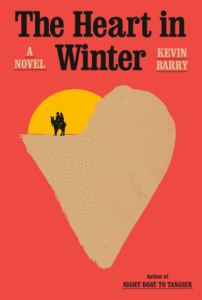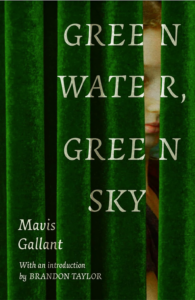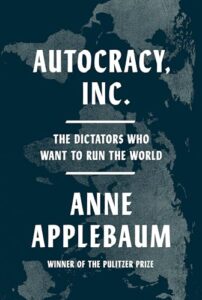Article continues below
Our gift basket of gorgeous reviews this week includes Becca Rothfeld on J.D. Vance’s Hillbilly Elegy, Brian Dillon on Sarah Manguso’s Liars, Sam Adler-Bell on Anne Applebaum’s Autocracy, Inc, Hamilton Cain on Kevin Barry’s The Heart in Winter, and Hermione Hoby on Mavis Gallant’s Green Water, Green Sky.
Brought to you by Book Marks, Lit Hub’s home for book reviews.
*

“In 2016, the well-meaning liberals who would later display in-this-house signs on their lawns were in the market for a certain kind of book. They needed a primer on that enigma, the White working class…right-thinking liberals wanted an emissary from the heartland to assure them that Trump did not oblige them to change their lives or reexamine their politics … In nearly all the legacy media outlets, including this one, it was hailed as an eloquent and nuanced explanation for Trump’s otherwise baffling allure … This is one problem with identity politics, with its mania for electing envoys: The members of a marginalized group who enjoy enough of a public platform to speak on its behalf are often not representative …
Hillbilly Elegy, then, was never a good-faith sociological foray. It was always a performance, a conspicuous display of homey authenticity … The book is a mush of reminiscence and ill-founded speculation … There is no greater vindication of the suspicion that poor taste is a form of moral deficiency than the initial reception that greeted Hillbilly Elegy. So eager were critics and pundits to find an apologist for the White working class who was not blatantly racist that they overlooked Vance’s fatuousness, his willingness to play up his hokeyness for the benefit of his liberal audience and the ultimate banality of his message.”
–Becca Rothfeld on J. D. Vance’s Hillbilly Elegy (The Washington Post)
“Jane stays, because she believes a certain narrative: Theirs is a happy marriage, a happy family. Liars is an unflagging and acridly funny assault on that story, but also a formally canny study of how such tales get told—and how fragile our replacements may turn out … John is both a convincing stand-in for large and small aspects of patriarchy, and a pure artifact of Jane’s rage, a caricature from which much of the novel’s exasperated comedy derives—’Why are you still with him?’ It is possible, Manguso’s broader narrative drift seems to suggest, to come back from this rage (and disbelief at one’s credulousness) to rescue much from life and art. But the litany—telling the marriage as one worries a rosary—remains, a weight of mundane fact that follows Jane around … It is not so much that Manguso’s narrator is merely unreliable, hiding her own spousal failings and misrepresenting a more innocent or hapless John. Rather, Liars is interested in all the levels of storytelling that make up a marriage, that invent or bolster the idea of marriage in the first place, even for a smart and skeptical woman like Jane. Nobody is not a narrator in this setup; they are all spinning competing tales.”
–Brian Dillon on Sarah Manguso’s Liars (The New York Times Book Review)
In the past decade or so, Applebaum has followed a not-unfamiliar trajectory from neoconservative Atlanticist to anti-populist Jeremiah. Her previous book, Twilight of Democracy, looked at why so many of her former allies on the right—Thatcher and Reaganite activists and journalists in London, Washington, Budapest and Warsaw—had abandoned classical liberalism for some species of reactionary nationalism … Applebaum’s demeanor in that volume was befuddled outrage: Why had her friends abandoned the values (‘pro-European, pro-rule-of-law, pro-market’) she thought they shared? Perhaps they were always just wounded narcissists and fame-hungry liars, channeling the ‘authoritarian predispositions’ of the masses. To her credit, Applebaum’s new book risks a more sophisticated, and less flattering, answer: Globalization did work, only not how she and her friends assumed it would … In short, the world system accommodated the needs of autocracy; the autocrats were not required to change …
She’s no anticapitalist, but her recommendations for reforms to the financial system—requiring companies to be registered in the name of their actual owners, for example—are concrete and admirable. Her foreign policy, however, suffers from a certain fuzzy patriotism … I abhor many aspects of the regimes Applebaum singles out for ridicule. My position on liberal internationalism has always been like Gandhi’s (perhaps apocryphal) attitude toward ‘Western Civilization’—it would be a good idea. But Applebaum’s just-so stories make it harder for her readers to see the world clearly, to understand why some countries align with America’s enemies and some don’t.”
–Sam Adler-Bell on Anne Applebaum’s Autocracy, Inc: The Dictators Who Want to Run the World (The New York Times Book Review)

“The Heart in Winter is not only set amid the frontier of the republic, but it also stakes a claim on our language, stretching and expanding it across boundaries of vocabulary, syntax, and speech. Barry tucks an impressive array of literary and cultural Easter eggs into the novel, alluding to Borges, Hitchcock’s Psycho, and Stephen Dedalus’s deceased mother in Ulysses … Like all brilliant dramatists, Barry wears the twin masks of tragedy and comedy with equal grace … Although The Heart in Winter feels characteristically Barrian in its themes—plumbing, for instance, the depths of desire and mortality—it’s a surprisingly religious novel. Bits of Christianity are twined in its DNA; affliction finds a counterweight in the transcendent…
For all its ruthlessness and sexy talk, the book dwells on faith—or at the least an enduring optimism. This fundamental American creed is realized in the poignant final chapter, which owes a debt to the concluding paragraphs in True Grit: Polly’s fate aligns with that of Portis’s Mattie Ross. Time marches on. Has Barry written the Great American Novel by a non-American?…His exiles have their limitations but also the freedom to resist our childish white-hat notions of morality and justice. And never has an outsider’s eye felt more necessary—by taking on the myths and tropes of the American West, Barry confronts the inequity in our immigrant culture, the lack of social mobility we view as the engine of our democracy.”
–Hamilton Cain on Kevin Barry’s The Heart in Winter (The Los Angeles Review of Books)

“In an essay titled ‘What is Style?’ Mavis Gallant, whose deserved reputation as titan of the short story overshadows her achievements as a critic, accidentally answers an even larger question, namely: what is fiction? It is a matter, she insists, of what an author has to say, and what an author has to say is simply that ‘something is taking place and nothing lasts.’ Is this always what an author has to say?—Gallant is writing solipsistically (as everyone can’t help but do) rather than with the universalism she intends. When she elaborates, it’s with a fulsome, wandering list that aptly conjures the specific pleasure and mystery of her own work, not least the exquisite Green Water, Green Sky: ‘Against the sustained tick of a watch, fiction takes the measure of a life, a season, a look exchanged, the turning point, desire as brief as a dream, the grief and terror that after childhood we cease to express’ …
Told in four economical, emotionally rich episodes, the short book takes the measure of not ‘a life’ but several, in their cross-currents and lasting reverberations … Implicit within the author’s roving litany of what fiction is—’a season, a look exchanged, the turning point, desire as brief as a dream’ and so on—is the quality of irresolution. We are, as Gallant intimates in her sly but irrefutable way, endlessly vulnerable to and altered by one another. Nothing is fixed or settled, the ticking watch remains and as long as it keeps ticking the meaning keeps changing. Perversely and rightly, it’s this that lends Green Water, Green Sky its lasting quality.”
–Hermione Hoby on Mavis Gallant’s Green Water, Green Sky (The Financial Times)



